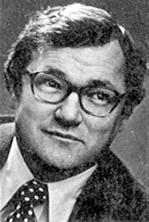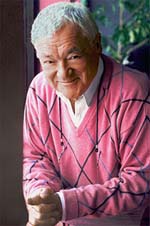
|
THE LIMELIGHT The Beatle menace: how to preserve public safety when four kids from Liverpool visit Canada - by Allan Fotheringham AN OTTAWA BEATLES SITE SPECIAL REPORT! About the writer: Allan Fotheringham, a top ranking Canadian journalist for the past 48 years (34 of them as a columnist) has been entertaining and educating countless Canadian readers through his reports in the Vancouver Sun, Southam News, and the Globe and Mail. He has been described by Time Magazine as Canada's "most consistently controversial newspaper columnist." For 10 years, Allan had also made television appearances on CBC's Front Page Challenge.Some of Allan Fotheringham's literary awards are: • Southam Fellowship in Journalism, 1964 His illustrious career also included writing for Maclean's magazine which he did for 27 years. From what Allan told me over a telephone conversation is that his report on the Beatles arrival into Vancouver just so happens to be the very first article he ever wrote for Maclean's. Even as we talked, Allan's memory about the Beatles Vancouver tour itinerary are as fresh today as they were yesterday! - John Whelan, Chief Researcher for the Ottawa Beatles Site, August 26, 2004. |

|
|
|
||
|
THE LIMELIGHT The Beatle menace: how to preserve public safety when four kids from Liverpool visit Canada VANCOUVER, THE NARCISSUS of the West Cost, is noted for its leadership in the organized chaos that now characterizes so many public events. It was in Vancouver that the hilarity of the Grey Cup first escalated into ugly riots. It was Vancouver that provided the first raucous shouting-down of a Canadian prime minister in the 1962 election campaign, a precedent that thereafter plagued John Diefenbaker across the country. So it was entirely appropriate that the Beatles, who have erected a financial empire on the basis of mass hysteria, should make their first Canadian appearance in Vancouver, and that the first Canadian fans to be sent to hospital with crushed ribs should be from B.C.'s excitable metropolis. The Beatle invasion of Vancouver was more than an orgiastic experience for the 20,621 fans who assembled in Empire Stadium on the sultry Saturday night of August 22. For law enforcement authorities it was also a deadly serious exercise in crowd control, civil defense, and the protection of several hundred youngsters who literally risked their lives trying to get close to their idols. For police in Toronto and Montreal, it was a foretaste of what to expect at the Beatles' appearances in those cities on September 7 and 8. For R.D.E. Cook, a St. John Ambulance supervisor whose staff treated scores of hysterical and/or trampled beatlemaniacs at Empire Stadium, it was a rehearsal for the Real Thing. ("You have a good preview," he told his staff after it was all over, "of what you'd be called upon to do in a full-scale emergency.") Finally, the Beatles' invasion of Vancouver was a reminder that if enough newspaper, TV and radio commentators tell enough youngsters often enough that there may be a riot -- then there assuredly will be a riot. THE BIG BUILDUP FOR B-DAY This message was told often enough in Vancouver. The buildup began a full two months before the Beatles' scheduled appearance at the opening of the Pacific National Exhibition. Vancouver's two dailies, the Sun and the Province, set the challenge to Beatle fans by detailing the massive anti-riot precautions that police were planning. Peter Hudson, manager of the Hotel Georgia, where the group had reserved the entire twelfth floor, fretfully phone the manager of a hotel in Melbourne for advice on how to handle the Beatle fans. "I was given some useful tips," Hudson later confided, "but I'm not saying what they were, because that would give the game away." PNE officials, who had captured the lucrative first Saturday night of the Beatles' North American tour because they were able to provide a thirty-thousand-seat stadium for the concert, tensely outlined plans for ringing the stage with four steel fences ("Beatle baffles," they were called) and guarding the approaches with a two-hundred-man security force. The PNE planners were keenly conscious of another famous Vancouver evening seven years ago, when Elvis Presley's appearance in the same stadium touched off what the Sun called "the most disgusting exhibition of mass hysteria this city has ever witnessed." And Police Superintendent Ben Jelley flew south for a look at Seattle's Beatle invasion, and how the police handled it. As B-Day approached, gossip columnists competed in the number of Beatle rumors they could carry. A radio station tried to buy the beds that the Beatles were to sleep on. One store offered genuine locks of Beatle hair as a prize. The Georgia Hotel deployed uniformed Pinkerton guards at every entrance forty-eight hours before the quartet's scheduled arrival, and boarded up all but the main entrance. THE ORDEAL OF RINGO'S RINGER By dawn of B-Day, the usual complement of teenage girls were asleep on waiting-room benches at Vancouver International Airport, where the chartered Beatle airliner was scheduled to arrive later that day. About three thousand youngsters, most of them between ten and fourteen years, began an all-day vigil around the hotel. Many used lipstick to scrawl their names and Beatle slogans on the plywood barricades; some pre-pubescent girls threw themselves against the barrier and kissed it. Red Robinson, arbiter of the CFUNtastic Fifty Pop Tunes and doyen of Vancouver disk-jockeys, poured gasoline on troubled waters by hiring a boy who looked like Ringo Starr, outfitting him in a Beatle wig, and then broadcasting rumors that the drumming Beatle had been seen around town. When Ringo's ringer drove up to the Georgia Hotel, the youngsters mobbed his car. In the resultant confusion a girl was knocked down, one wheel of the car rolled over a policeman's foot and some teenage boys managed to swipe two revolvers from policemen's holsters. (Later that day, Robinson partially redeemed himself; at the insistence of police, he interrupted the Beatles' performance to broadcast an appeal for order from the stage microphone.) But the real hero of the day was an anonymous American customs official. By radioing the Beatles' Lockheed Electra to turn back to Seattle to complete the pilot's customs clearance, he probably averted a major riot. Instead of confronting the mob at the hotel, the Beatles landed hours late and, with a quick roadside stop for nineteen-cent hamburgers and a pot of tea, dashed to the stadium for a press conference. The Beatles press conference has become as memorable as institution as President Roosevelt's fireside chats; and at the Vancouver session, Paul, John, George and Ringo were at their flippant best. Eighty-nine newsmen crowded into a room designed for forty, including the travelling Beatle experts from the Liverpool Echo and London Daily Mirror, the CBC's royal tour expert, several writers from the U.S. and Eastern Canada, a score or so of electronic journalists and disk-jockeys, five reporters from Victoria -- the Empire's last anti-Beatle outpost -- and a thirteen-year-old Beatlemaniac named Susan Lomax whom the Sun sent along to get the Youthful Viewpoint. All of them were aware that the craze has now reached the stage where the press needs the Beatles much more than the Beatles need the press; and all of them were charmed by their now-familiar Liverpudlian cockiness. When a radio reporter asked how the boys felt "now that Britannia rules the waves," Paul McCartney jeered: "Oo, you work that one out, didn't you!" Asked about the customs delay, John Lennon replied: "We had to be deloused." Most disarming of all was the Beatles' cheerful admission that, when nubile young girls throw themselves at their feet, they have no compunction about picking them up. (Question: "What is the most unusual request you've had from your fans?" Lennon's leering answer: "Oo, now, I wouldn't like to say.") After the long buildup, the performance itself was no anti-climax. The Beatles, naturally, couldn't be heard above the shrieking that rolled out over Hastings Street. The first-aid posts looked like disaster areas, filled with sobbing, vomiting girls. A teenage gang outside the stadium tried three times to bash down a gate; when they finally succeeded, police controlled them with snarling German Shepherds. The fire warden sent out a hurry-up call for the inhalator squad as girls passed out by the dozens. The closing chords of the Beatles' twenty-eight-minute performance sparked a dangerous stampede towards the stage. As the crowd surged against the barriers, police quietly told the reporters and PNE officials behind them where to jump if the mob broke through. Jack Wasserman, the Sun's fearless gossip columnist, was one of them, and later told his readers: "If those thousands of hysterical youngsters had pushed through the barriers, we'd have been trapped...with a human stampede in front of us and a high wire mesh fence behind." (A few days later, it should be noted, Wasserman had yet another narrow escape: he dislocated a shoulder when an ostrich sat on him during a stunt race at the same stadium between ostrich-drawn sulkies.) Meanwhile, the Beatles dropped their instruments, dashed to a waiting caravan of cars and headed for the airport with sirens ablast, despite the attempts of one boy who threw a bicycle under the lead motorcycle escort. As PNE skyrockets lit the sky, a few girls broke through the barriers and rolled on the floor, fighting for possession of the jellybeans that littered the stage. The rest of the crowd, more or less orderly at last, filed out. It was all over but the statistics. For twenty-eight minutes of admittedly dangerous work, the Beatles had collected $48,000, caused almost two hundred casualties and frightened the daylights out of several hundred policemen and several thousands parents. Toronto police, preparing for the worst, last month cancelled all leaves for the Beatles' Labor Day appearance. Montreal police were in urgent correspondence with police forces in other cities where the Beatles have appeared. And Variety, the show-biz bible, estimates that the Beatles, from earnings on everything from personal appearances to bubble gum endorsations, will take fifty million dollars out of North America this year.
ACKNOWLEDGEMENT:
|
||
